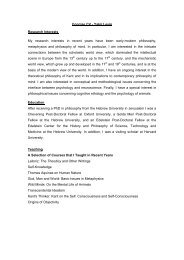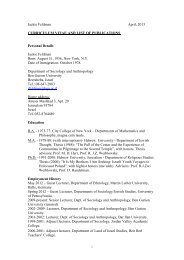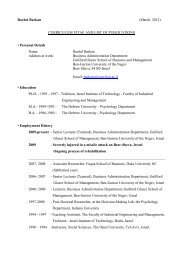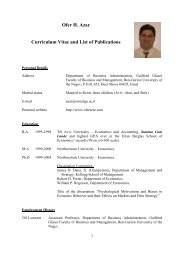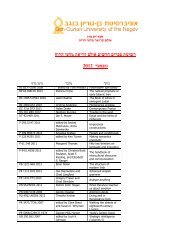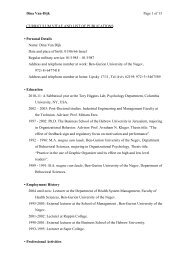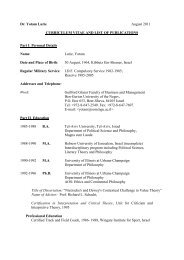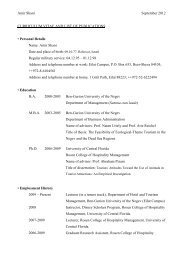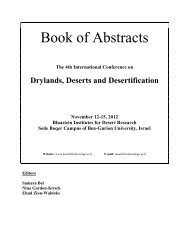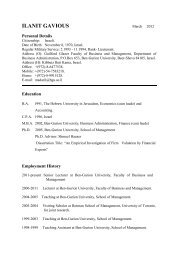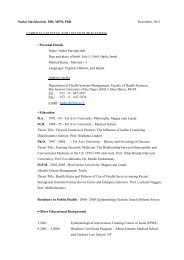cover 2006
cover 2006
cover 2006
Create successful ePaper yourself
Turn your PDF publications into a flip-book with our unique Google optimized e-Paper software.
up anything. Finally, they examined<br />
the optimal outcome, the maximal<br />
win-win situation that would<br />
increase the pie for all. Their<br />
findings: at a given stage of<br />
negotiations, an IGO proposal<br />
enhances the chance of reaching an<br />
agreement. “A possible explanation<br />
is that in proposing IGOs, parties<br />
send the message that they are<br />
willing to be flexible towards the<br />
other side, which might create an<br />
atmosphere of camaraderie and may<br />
lay the basis for trust and<br />
reciprocation, or mere imitation,”<br />
says Moran. Unfortunately,<br />
although these offers improved the<br />
outcome for all, participants did not<br />
use them enough.<br />
Moran is anxious for others to<br />
benefit from her findings. “I teach<br />
important concepts about managing<br />
negotiations successfully that<br />
involve strategies for enlarging the<br />
pie and creating value,” she says,<br />
adding that a key challenge is to<br />
teach these principles in a way that<br />
makes them easily transferred from<br />
the classroom to real life situations.<br />
Moran graduated with<br />
a Ph.D. with honors<br />
from BGU, where she<br />
teaches courses on<br />
negotiations, judgment<br />
and decision making<br />
and organizational<br />
behavior.<br />
Among her other<br />
numerous research<br />
projects, Moran has<br />
explored the effect of<br />
emotions on<br />
negotiations,<br />
specifically how envy<br />
influences deception.<br />
“Part of our nonrational<br />
behavior in<br />
negotiations comes<br />
from our emotions.<br />
Our feelings can limit<br />
our ability to negotiate<br />
rationally,” she says.<br />
But how does emotion<br />
cause us to deceive or to be truthful?<br />
While the literature of decisionmaking<br />
explored ethics and<br />
deception – when do we show all<br />
our cards and when don’t we? When<br />
do we make promises we don’t<br />
intend to keep? – it hadn’t<br />
previously <strong>cover</strong>ed the widespread<br />
emotion of envy.<br />
Moran checked subjects’<br />
willingness to deceive the objects of<br />
their envy. In a study carried out<br />
with Maurice Schweitzer from the<br />
University of Pennsylvania, they<br />
created a competitive work scenario<br />
Apparently, when you<br />
envy someone, you do a<br />
cost-benefit analysis.<br />
You adopt unacceptable<br />
behavior at a low<br />
psychological cost<br />
to induce envy or had participants<br />
read outstanding resumés of other<br />
individuals. In one experiment,<br />
students were given fictional<br />
resumés about other students and<br />
were pitted against them in<br />
negotiations. The results here were<br />
absolute: in negotiations with<br />
someone who had the so-called<br />
‘ideal resumé’ – service in an elite<br />
army unit, top grades, vacations to<br />
exotic spots etc. – students lied more<br />
than when they didn’t envy their<br />
rivals.<br />
“Apparently, when you envy<br />
someone, you do a cost-benefit<br />
analysis,” says Moran. “You adopt<br />
unacceptable behavior at a low<br />
psychological cost.” In other words,<br />
when we envy people, we can<br />
belittle them without compunction<br />
because we feel justified. We assume<br />
the objects of our envy are arrogant<br />
and vain, indulged and smoothtalking.<br />
The element of shadenfreude, of<br />
deriving pleasure from the troubles<br />
of others, also plays a part here.<br />
There’s little price to pay and<br />
immense satisfaction in deceiving<br />
the objects of our envy, or in the<br />
accepted jargon, greater benefit at<br />
lower cost. Translating this into<br />
organizational behavior, Moran<br />
explains that while we think we<br />
must market ourselves or flaunt our<br />
achievements in interviews and<br />
meetings, blowing our own horns<br />
has its own dangers too.<br />
BGU NOW 39



